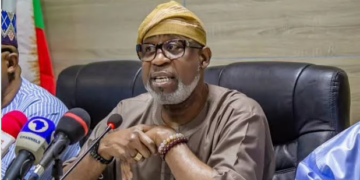What led to Senator Natasha Hadiza Akpoti-Uduaghan’s six-month suspension from the Senate by the Committee on Ethics and Privileges needs little elaboration. It was, in essence, an avoidable clash of ego between two powerful figures—one a rising political star, the other the presiding officer of Nigeria’s upper chamber. What should have been a routine administrative disagreement was allowed to metastasize into a public spectacle, exposing the fragility of temperament and the absence of restraint at the heart of Nigerian politics.
The episode began with what seemed a trivial matter: a change in Senator Natasha’s seat in the Red Chamber. In most parliaments, such an alteration would have elicited mild protest at best. But in Abuja, it became the spark for a melodrama that played out with unflattering intensity. Words were exchanged, tempers flared, and soon the chamber—supposedly a forum for sober deliberation—descended into a theatre of personal indignation. The result: a six-month suspension for Natasha and a dent in the credibility of Senate President Godswill Akpabio.
Six months of wasted energy, wounded pride, and strained relationships—all for a quarrel that could have been resolved in minutes. What was once a cordial rapport between both individuals collapsed under the weight of mutual intransigence. Now, as they return to share the same chamber, one can only imagine the discomfort when their eyes meet—two estranged allies haunted by the echoes of an avoidable confrontation.
One is tempted to ask: what if Natasha had simply complied with the seating order, taken her new position, and later sought a private audience with the Senate President to make her case? What if Akpabio, in the wisdom expected of a presiding officer, had chosen to ignore her public protest, chalking it up to a momentary outburst? Such scenarios are not acts of weakness; they are marks of restraint, the invisible strength that underpins effective leadership. But politics, particularly in Nigeria, is often performed rather than practiced. Theatrics too easily replace tact.
History offers no shortage of parallels. In Britain, the protracted animosity between Theresa May and then-Speaker John Bercow, once over procedural disputes, eventually poisoned relations within Parliament. In America, the Pelosi–Trump standoffs turned the legislature into a stage for partisan point-scoring. In both cases, personal pride eclipsed institutional responsibility. The Natasha-Akpabio saga, though smaller in scale, is born of the same human flaw: the inability of power to accommodate humility.
The costs are more profound than they appear. Beyond Natasha’s lost months lies an erosion of public confidence in a Senate already perceived as detached from the people. Every public spat between legislators chips away at the moral authority of the institution. The chamber becomes less a symbol of collective wisdom and more a mirror of personal vanity. Nigeria’s young democracy can ill afford such displays.
For Natasha, the lesson is one of strategic patience. Defiance may earn applause on social media, but politics rewards discipline, not drama. The Senate floor is not an arena for rebellion; it is a space where persuasion, compromise, and timing often yield greater victories than confrontation. Her passion, though admirable, must learn to coexist with prudence.
For Akpabio, the burden is heavier. As Senate President, he embodies the dignity of the institution. His response to provocation must set the tone for others. To engage personally in disputes beneath his office is to trivialize his authority. Leadership demands a thicker skin and a longer view. A smile, a shrug, or a simple “noted” would have carried more weight than a formal sanction. The great paradox of power is that it is most effective when least displayed.
That the two found themselves in this debacle is emblematic of a wider malaise—the personalization of governance in Nigeria. Political actors often interpret institutional decisions as private affronts, blurring the line between office and ego. In mature democracies, conflicts of this kind are handled quietly, behind closed doors, preserving both decorum and public confidence. In Nigeria, they too often become public brawls, cheered on by partisan spectators.
The tragedy is that there are no winners here. Both Natasha and Akpabio leave the episode diminished. Reputations are bruised, alliances fractured, and the chamber’s collective dignity compromised. Even reconciliation, should it come, will not erase the memory of the mudslinging. The damage, as always, outlives the quarrel.
There is still a narrow path to redemption. Both could turn the episode into a lesson in political maturity—an acknowledgment that leadership is not about assertion but about control. A quiet handshake, a shared smile across the aisle, or a collaborative bill could speak louder than all the words traded in anger.
In the end, the Natasha-Akpabio imbroglio is not just a story of two politicians at odds. It is a parable about Nigeria’s political culture—how ego too often trumps empathy, and pride overshadows purpose. Until restraint becomes a civic virtue, the country’s institutions will continue to wobble under the weight of personal ambition.
The true measure of power, after all, is not how loudly it roars in anger, but how calmly it governs in adversity.
Pensively musing





